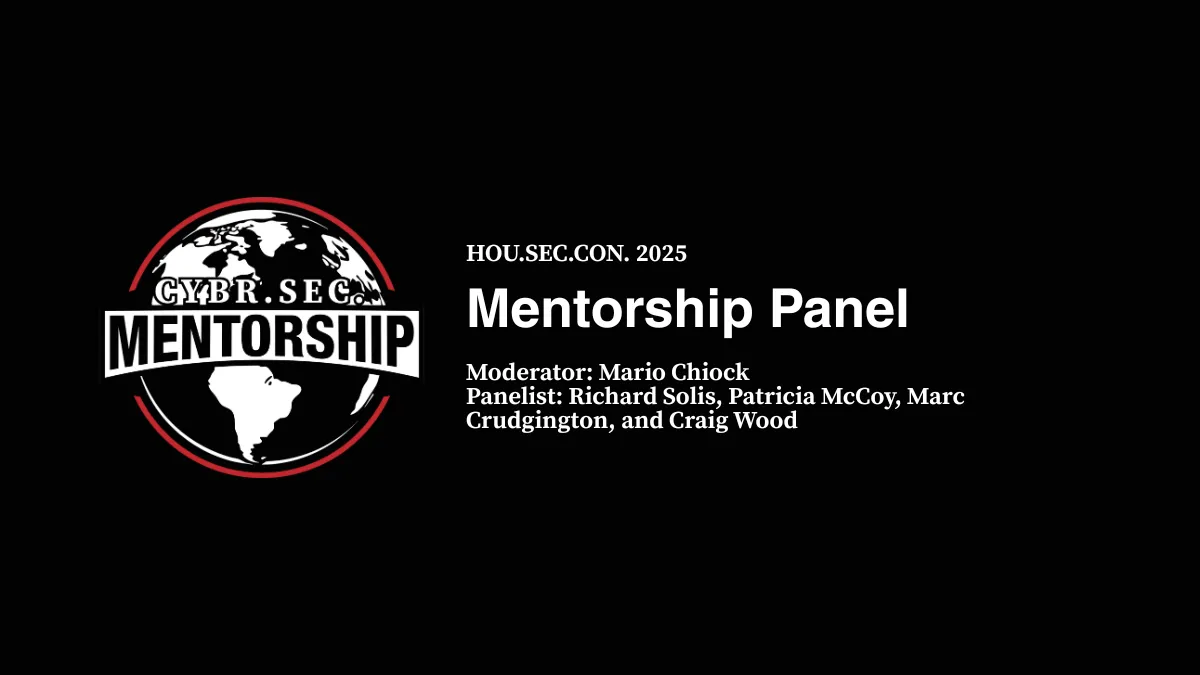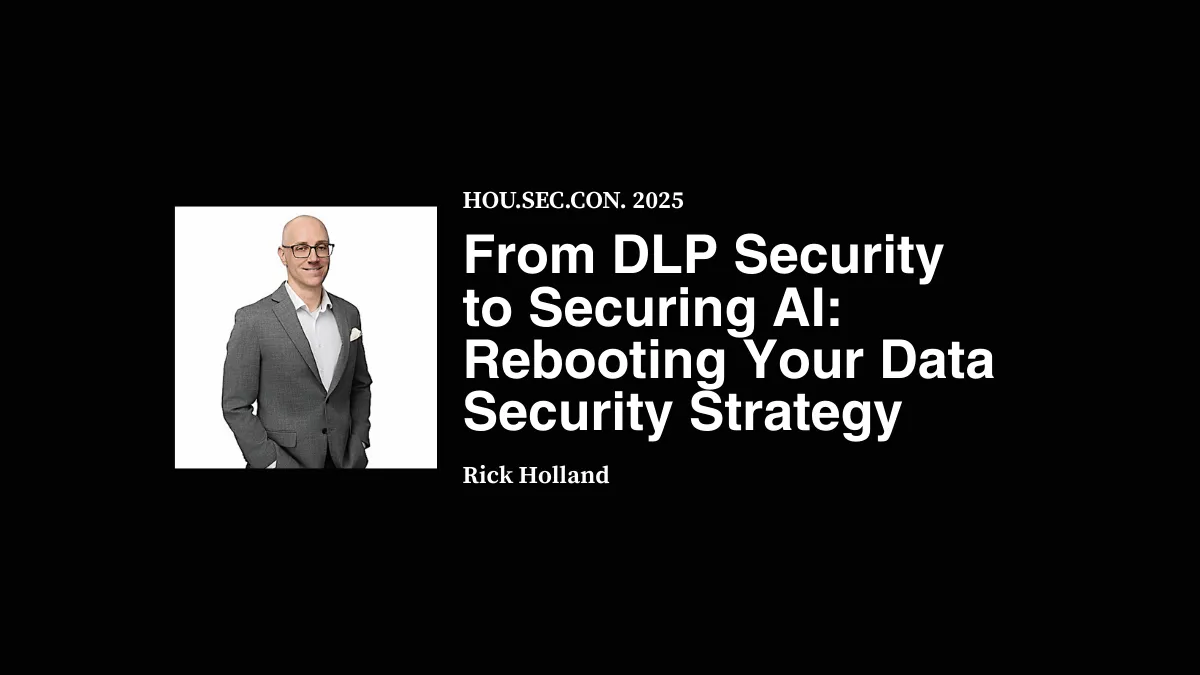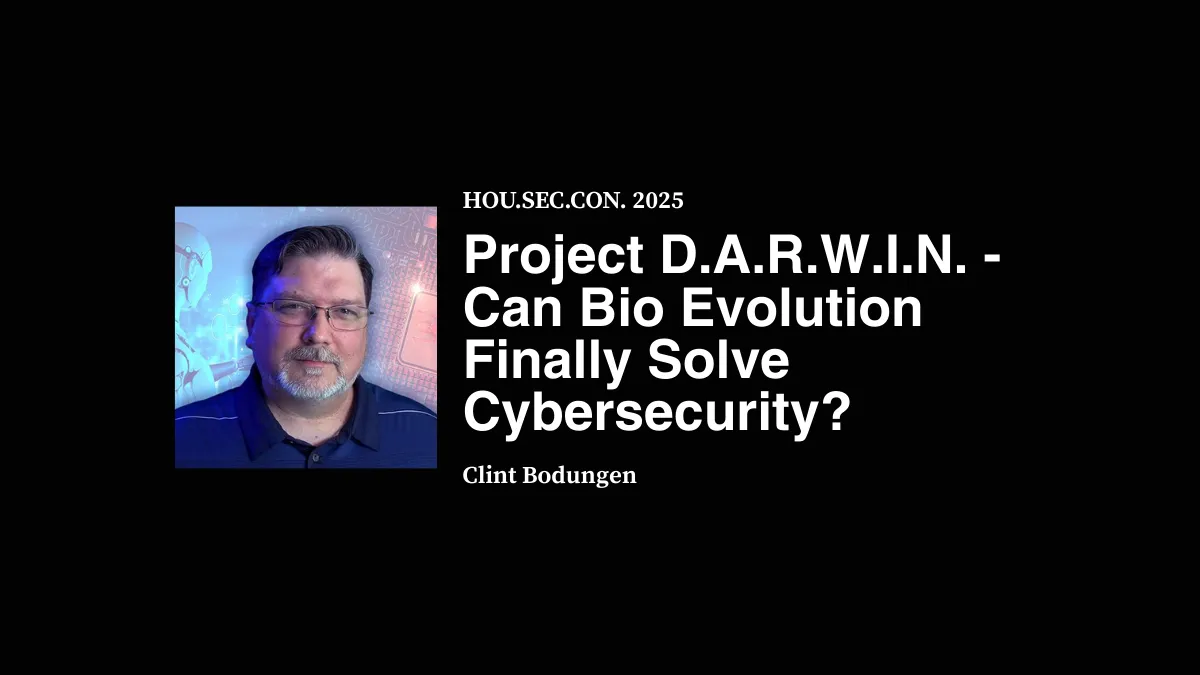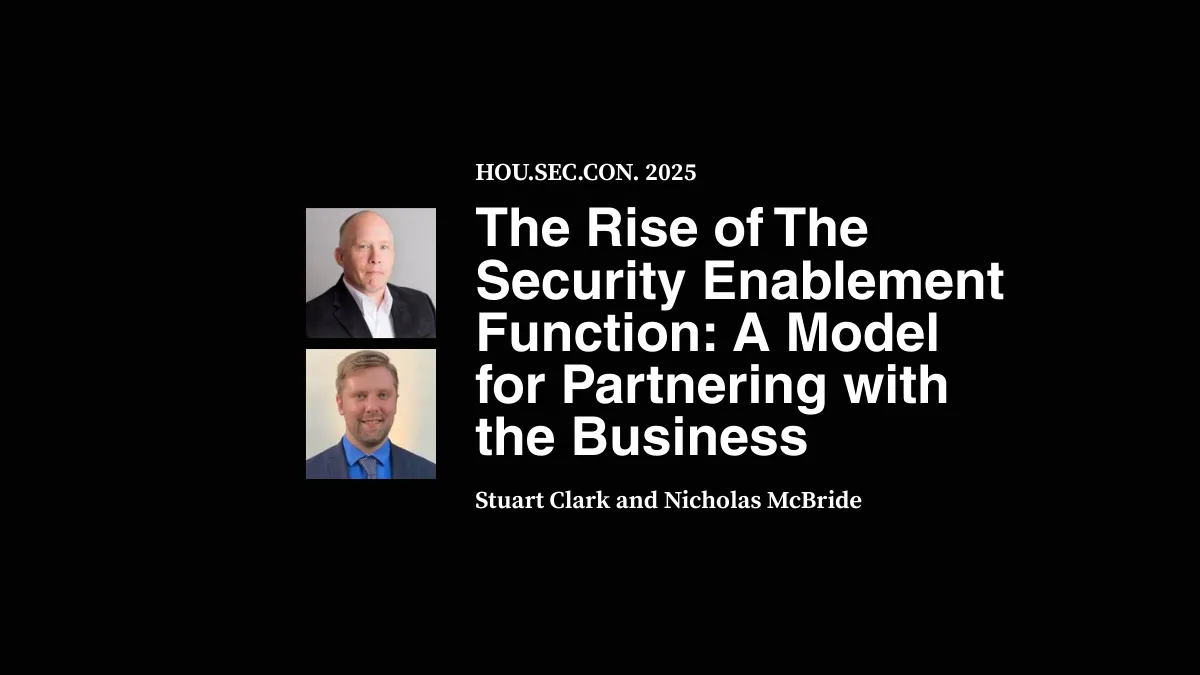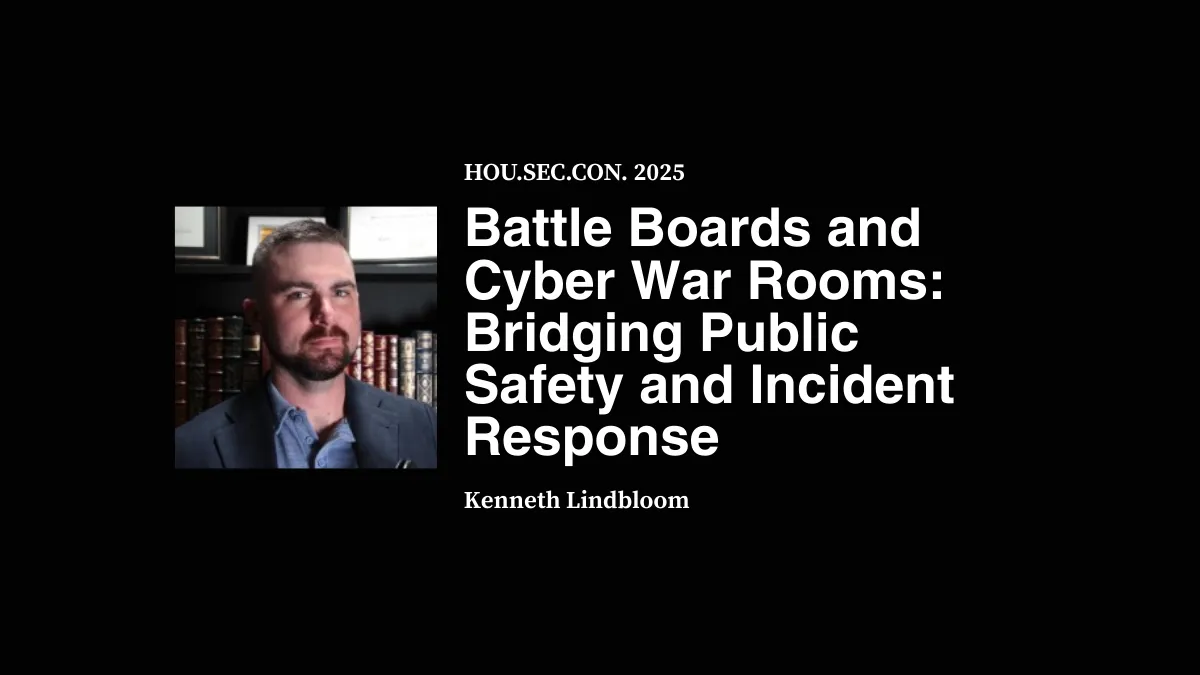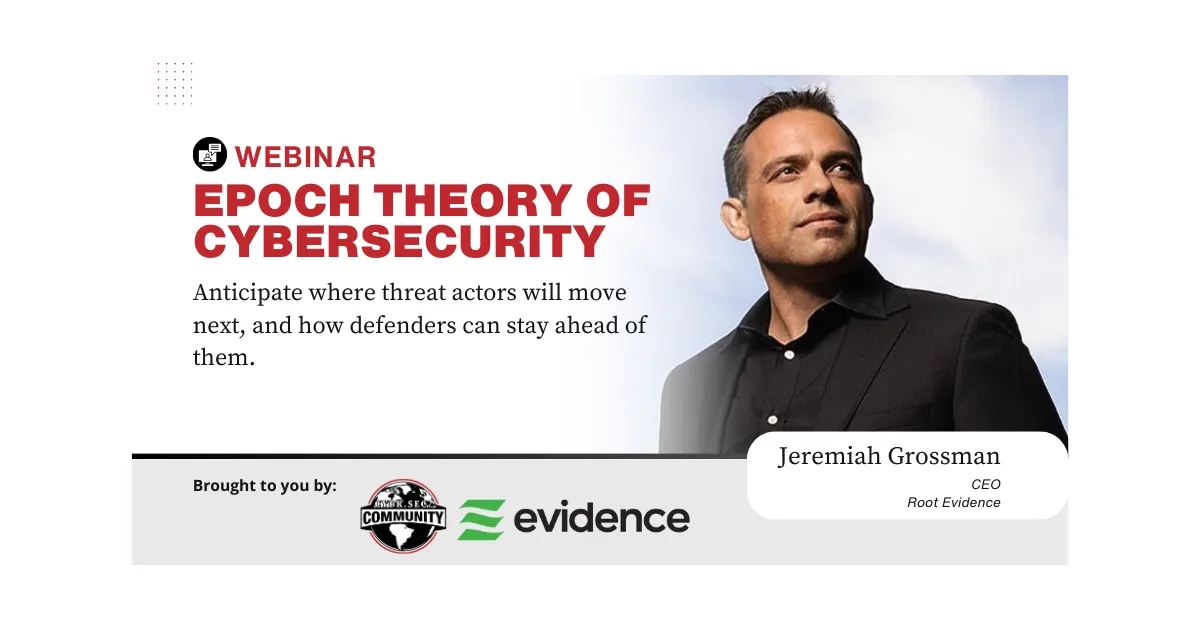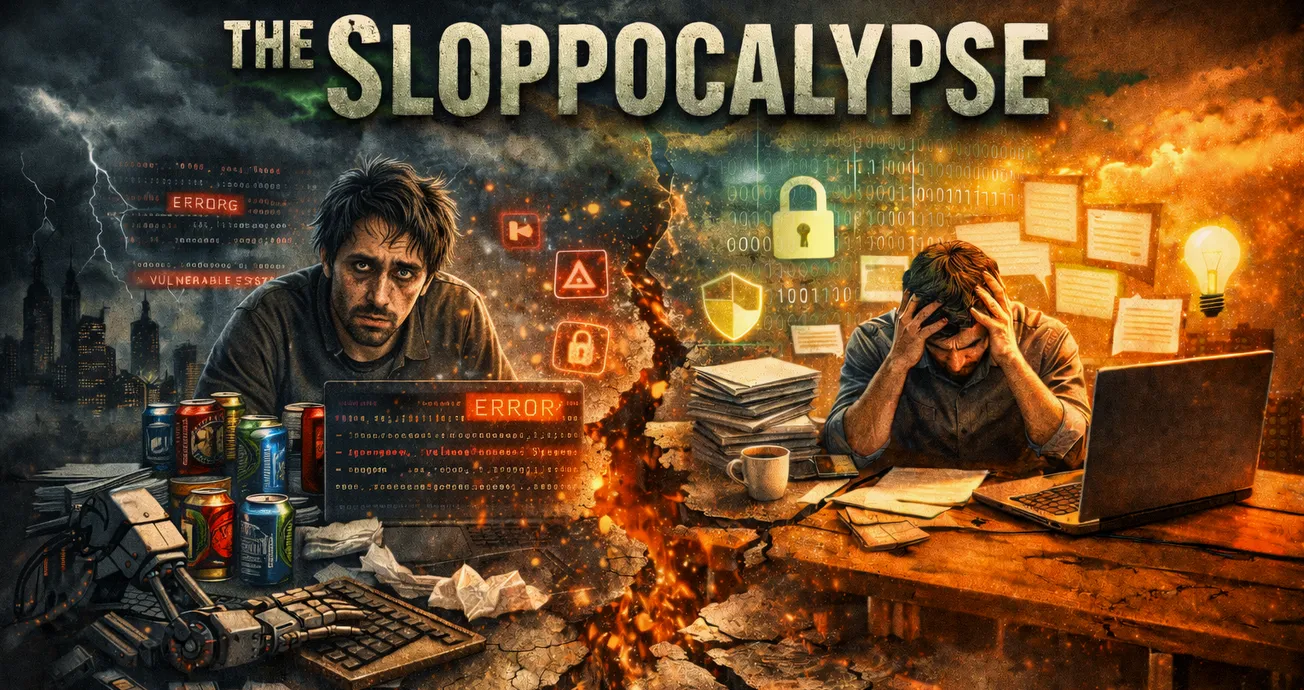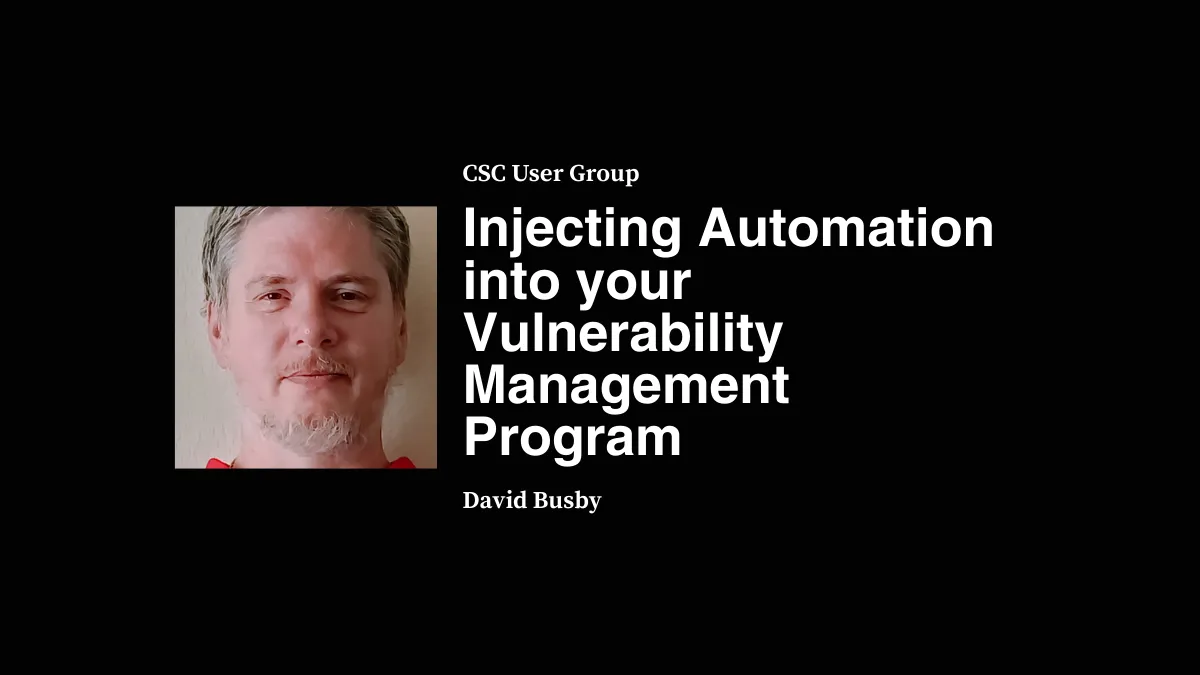Presenters:
- Moderator: Mario Chiock
- Panelist: Richard Solis, Patricia McCoy, Marc Crudgington, and Craig Wood
Transcript:
Announcing Mario Chicok, Richard Solis, Patricia McCoy, Craig Wood, and Mark Crudgington. Thank you very much. We all know. So thank you very much, everyone, for coming. We're going to have a panel with two very experienced mentors and two very experienced mentees. So please come up with very hard questions for them. Just to get started, I'm going to ask you a few questions for them.
But afterwards we will open it up for everybody to ask questions. So first of all, I'm going to ask, Patricia to introduce yourself. Hi. I am oh with this. Oh, sorry. That's my first panel. Hi. I am Patricia McCoy. Fun factor for me. I am a Frenchman. So. America. But I have been for a long time in history.
My background is in management and business and more than ten years of experience. But I transition to cybersecurity. Really love. And I have a passion for the for the, you know, for the MBA.
Hello. Hello, everybody. My name is Richard Sallis. Nice to meet you. First I want to give thanks to the mentors here. Taking the time to come and help out the mentees.
We appreciate that very much. A little bit about myself. I graduated, I launched our community college back in 2024, and now I'm a recent hire at Cyber One for vulnerability management and, my mentors. Thankfully, thanks to Marios guidance, you know, as being one of my mentors, they paved the way for me to get here where I am today.
Morning. Current one and, previous CSO for one of the the second largest distributor of chemicals globally for the last decade. Started out on my own, to create my own company in cybersecurity around DoD defense contracts, with CMC track, I have my CCP will be taking my course shortly. One.
Hello. So one of the facts is that, Craig is also running the mentorship program for ISC chapter in Houston. So if you're a student would be focusing on students. Of course. And then last but not least, we have my friend, Mark. Chris. Yep. Mark. Denton. Currently, I'm the VP of I.T. Infrastructure and cyber Security at Crane Worldwide.
Logistics. The name sounds familiar. Yes. He is the owner of the Astros. So I've been a long time CSO. I'm in the role right now. This is my fourth go round. And a full time cicerone, even though it's hybrid. Two roles have been hybrid and two direct. Previously, for a long time, I was, CSO at would force National Bank.
I've mentored a number of students through Lone Star as well as University of Houston. Have my own company on the side and now actually have two on the side. One's in stealth mode. But happy to be here and happy to share. Thank you. Mark. One one thing that Mark did not mention is that he's the author of two books.
So if you like to read, get his book. Yeah. And one was a bestseller. Amazon, right? Yeah. Anybody can write one book, but two, you know, there is also another fact that he doesn't want to tell you, but most of his mentees has been hired by him. So he has a good history of hiring. So. All right.
So to start the the start the panel. My first, I'm gonna, as, Mark, what initially motivated you to become a mentor? And how has that motivation evolved over time? Part of that was, and I'll get a little bit personal. I grew up without a father and going through my career. I did not have a mentor.
And, my father passed away when I was two. Was nothing, you know, crazy. But that experience stayed with me. But when when I, you know, came back to Houston, you started hearing a lot about the talent gap in cyber. And, you know, whether it's real, how real it is. It was definitely there. And I would force we were certainly hearing about that.
So I, I've always longed to mentor people. I enjoy, you know, just talking to individuals, finding out their career path to my career path was not normal. You know, I actually went to Lone Star, before it was Lone Star, then joined the Air Force, then landed in the Silicon Valley. So I had a really windy road through cybersecurity and it and, you know, I just wanted to help guide people that wanted guidance, whether it was in it or in cyber, because I'm fairly well versed in all of them.
I've done just about everything in it or cyber except for actually be a software developer. And I'm learning vibe coding now, so which is pretty cool. Python. So I just wanted to give back and help people out. I mean, it's a hard road to navigate if you if you're just because it's so broad and there's so many directions and you talk to ten different people and you'll get ten different answers.
You know, my my key takeaway from that is you just got to find your niche and what you like in this field. And then go for it. So that's and how has it evolved? I think it's, you know, like you said, I have hired, a few people, but I've also done more than that. And in terms of helping them find jobs, not necessarily through me, but that's how it's evolved into more of a, how do you get to the CSIRO instead of just how do you get into cyber or progress your career?
Thank you Mark. So correct. I've got a different question for you. What qualities do you look for in a potential mentee, and how do you decide if it's a good fit or not? So the first thing first thing I do is check the mic. Sorry about that. I hope nobody has fillings that just fell out. So for me, you can teach technology.
You can't teach hunger and passion. So what I look for in employees are, if you're sticking to a, definition of your job description, and this is what I do, and I don't, you know, separate from that. That's not what we're here. We're here to learn and grow. And that means expanding your horizons. That means that you should start getting used to being uncomfortable, because that means you're growing.
And so somebody that's hungry. Somebody that's interested in learning, somebody that's, interested in growing, is going to be passionate about what they do. And even if they're not good at it. Time, experience, training, support, backing, all of those things are, are things you can provide to somebody to allow them to grow in a position and be successful.
And I want to piggyback a little bit what Craig said. It's very vital for us as mentees to be the drivers. You know, we have to want that and have that passion fired up to, to be able to, to continue because especially challenges like times like these. Having that drive and passion will move you forward past that which will eventually align where you want to be.
Thank you. Also, another commitment. You know, be open to feedback. Yeah, I agree with all of them. I would add focus. Somebody that is focused well will have all of these things, you know, and they're not just kind of dabbling because they heard cybersecurity has a lot of jobs or pays well. They need to be focused and and committed.
Yeah. Let's say don't chase the money if you're chasing money just because you've heard, hey, there's money in it. There's a lot more than money in it. There's a lot of risk. There's a lot of stress. It's a passion. Absolutely. Especially in cybersecurity. Because you don't get on. You don't get a phone call saying, hey, nothing happened today.
Thank you. You get the something broke, something's bad. And why did you let this happen? We get all the downside. None of the up. So if you're chasing money, it will get there. Because if you're being passionate and good at what you do, eventually. But if you're going into it going, I want to make the big bucks right off, then you might get frustrated fast.
Craig, do you mind sharing with them what we're implementing now? And I say, and our mentorship come with the ikigai, the tiger. So what Ricky's referring to is a Venn diagram, about a Japanese concept called ikigai. And so basically, you're looking at four quadrants where you've got what you love, what you're good at, what the world needs and what you get paid for.
Right? So you can find your vocation, what you're really, you know, good at. But if there's no money in it, you're not going to be fulfilled. You're not going to meet your obligations. If you're really good at it and you can't get paid, what's the point? You know, maybe it's a passion for a nonprofit. That's a hobby.
Yeah, that's a hobby. Absolutely. But if you can find something you get paid for, you're not good at it. Well, you're going to always feel like you're insufficient. You're going to be uncertain, and you're going to create these problems. Find that warm, creamy center and that's where you want to be. You want to find out, you know, what can I do that some that's marketable, valuable and contributes and fulfilling to you.
And that way you you meet all those personal requirements as well as create a value to a business. Very good. Thank you. Craig. Patricia, got a question for you. And you share a key piece of advice from your mentor that significantly change your approach to a problem. I think I, I think, one very important is, you know, my mentor has been.
That is Mario, has been, you know, helping me know, giving me the answer is asking me question and guiding me to find my own answer, my own responses. I think that develop, you know, my critical thinking, develop my confidence. And, you know, I can I can it's like owning my own journey. That is what. Yeah, that's that's very important because a lot of mentees, they just want the easy way out and they want you to solve their problem.
And my way of mentoring is not to tell you what to do, but to coach you and guide you to do the right thing. You make the final decision, okay? Product method. The Socratic method. Yep. The best way to teach. Yeah. Okay, so Ricky got a question for you. What prompted you to seek out a mentor? And how did you find the right one?
What prompted me to seek, mentor was, I was, you know, I started out cybersecurity at college. I have a very, very narrow view towards the environment and what's really going on. While I was working at HBX, I was like, listen to podcast and get SMI idea how it is. And so what brought me into joining is to say the mentorship program was finding someone that has the way broad view and understands cybersecurity, not just cybersecurity, but IT and the business in general.
Which Mario, you know, he can tell you, you probably heard him say, like a lot of people go with him to for a psychoanalyst because they're interested in that. I was one of them, I'll be honest. And so with him, because that's all I heard. And so with hand brought in my view and honing my skills that leveraged me to be where I am right now, and with the cyber one.
So one of the things that you know, I like to do with mentees is tell them the opposite. In the case of, Ricky, he wanted to be a soccer analyst. And for for a bit of time, my job was to tell him, no, you don't want to be a soccer analyst, because there is more to it.
And I think he found out why I told him that. Not because I don't recommend people to be a soccer analyst is because you need to look at the big picture. And your mentor's job is to show you the big picture. So. Okay. Mark, how do you balance giving advice with encouraging your mentee to find their own solutions?
Well, that's kind of easy. It really depends on, you know, what advice they're asking for. I always tell people I'm just one person. So if you're strictly listening to one person, you need to figure out what your collective is. But encouragement, you know, it's really trying to understand what their needs are and what they're asking about and then encouraging them, but just guiding them along and not making the decision for them, but asking like open ended questions like, have you thought about this or have you thought about that?
Just depends on what they want to do, but it's not answering for them. They come to me with a problem. I'm not going to tell you do this, you know. Now they may come to me and say, no, I need you to answer me. Or if you have that open, open, you know, dialog, I really need your help now.
I have no one else to go to. I might give them a little bit more direct answer, but it's really just guiding them and helping them navigate in and find their own answer. Thank you. Mark. Craig, how do you measure the success of a mentorship relationship? So there are there are different metrics around this. You know, you can look at it from a purely professional perspective.
You can look at it as a fulfillment. If someone were to quit it and say, this is not what I'm really built for and go find something that they're passionate about, that's still a success. It just depends on, you know, how you're driving, that the individual needs to be fulfilled. One of the things that I've done with a lot of mentees, that were employees of mine, was to steal from a company that I partner with, and they do a career life planning.
And one of the things that people don't think about is life is a personal endeavor that has to match up on a schedule as well as your passions. So if you're saying, I want to have a child, I want to buy a house, I want to buy a car, I want to do, I want to move. And you're trying to push for all these certifications, and you're doing all of it at the same time.
Well, you're going to have some pretty nasty junction points that you need to think out. So if you're not putting it up on a whiteboard, if you're not meeting with them, what are your objectives? What are your plans where your goals? Then you're not going to be able to establish what success looks like. And there's no measuring stick.
So you need to find out first, what are you trying to achieve? What are you trying to achieve it? What are the roadblocks around the way and where does life intersect with that? Because if you're not taking that into account, you're going to miss the mark. Thank you. So, Patricia, how do you prepare when to meet with your mentor?
To make the most out of it. We normally have, you know, our format. I partner for mentorship, and I used to say to, I need, you know, we defined our last meeting. We have some actions that we left for the next 30 days. I and you, we review that. How are you going with the progress?
What are the. You know, the problems that I have that he can help me. And we go from there and we review and adjust. You know, my goals depending where I want to I wanted to go whether when it try, you know, to see if I like it or not. Always Mario said to me, you like to see too many things at the same time.
You need to start just with one. Let's do it for the 30 days and see whether you think about it. We can target and we can move forward from that point. One thing I want to, with, Patricia is as as mentees, guys like. And girls, we gotta make sure we are kind of like soft clay being molded and not come in hard.
Okay? We got to adjust. We got to adapt. We got to roll with the punches. And, I would, and we gotta, you know, that's that's just just life. You know, we gotta, like, mold and be open. Okay, Ricky, I have a question for you. What surprised you the most about the mentorship experience? I think what surprised me, it was like the bond I was able to to form with my mentor.
And like with Craig, you know, we've we formed bonds. I mean, even inviting, Mario to come eat dinner at my house, like meatballs, you know, like, something simple. You know, it's the bond you share with the person that kind of grows and blossoms. So now I have a question for the entire panel. How do you establish boundaries and expectations at the start of the mentorship relationship?
And, you know, that that's kind of at the initial onset, some sometimes when the mentor mentee relationship, there are guardrails that are set up already, but it's in that initial meeting and it's almost like you have to develop a charter. You may write it down, but, you know, one of the things I like to get is a commitment from the person.
And like, you know, I'm happy to meet with them as often as they need, you know, to a certain extent. But it's like coming to that agreement in the initial meeting or even before you've established that relationship, because sometimes it just won't work out. You know, you say, if you want, they want to meet during the day and you can't all the time may not work out.
And it's better to just let them find a mentor that's going to meet them where they're at. Instead of trying to fit it in. So it's really establishing those boundaries upfront in the initial meeting. And don't wait too long. You need to do this very early on on the process. It should be one of the first things you do fact both ways for the exactly and the mentor.
And there's nothing wrong with not having a good match. I mean, I have seen mentors that don't work very well with a mentee, but they change, you change them, and it works perfect for it. So it's still a challenge for me to be completely frank. You know, I before I got into it, I was a bartender and, and, in that regard, I remember tables telling me, you know, thank you very much for a wonderful experience or a guest.
And, my response was always, I can only have as much fun as you'll allow me to. And when it goes back to the mentee relationship, you know, you have different personalities. And I've got a professional and a personal life, and you do need to establish those boundaries up front. But people are going to reach out even when you establish those boundaries.
And it's so it's difficult to say, hey, you know, I need to commit some time. Can we talk about this later and not ghosting them? You know, so it's important because they have dreams, they have hopes and they have desires. And the last thing you want to do to somebody that's very passionate and may not have great social cues is to crush their, their hopes, you know, and say, hey, I got things I got to do, can I get back to you?
And it's like deflated. So you want to be sensitive to that, but at the same time, there's only so much time, and time management needs to be something. You're also mentoring sometimes yourself. And I piggyback on what Craig said. It's important for anybody just to understand those social cues and establish, okay, what we can do, what we can do from the start.
Even if it's just. No, it's it's okay, guys, you know, to something else. I think is also very important to be respectful, you know, way that personal time and the professional time of our mentors and the mentees, too, and the sense and you need to be very, you know, sincere about what you can do and what you can not.
Because, defining speculation is very important that that you can have a very good relationship and that you know, is things change. Being sincere is the best way, you know, to go over that. Any problem that could come out, you know, and that is has been very important for me through having very strong, mentors during my career for an I.T program management to transition to cybersecurity, you know, is, having out those figures has been a really helped me think, one thing I do when I talk, Mario is like, these guys, you know, the the the mentors are volunteers.
So we got to understand that and respect you know, they all have their personal things. As mentees. We gotta try to accommodate to their needs because they're they're taking the time and being gracious to help us out. You know, it's a balance. It's a it's a balance. I mean, servant leadership means that you are there for others and you have to be flexible on both sides.
But yes, I do appreciate what you're saying as well. Flexibility is very important. I mean, there are times that, you know, I have my regular cadence. I can not make it so we can either reschedule or we can try to do an alternative, you know, a phone call or text message or or just not online. So, so I'm going to open it up for, for the audience.
If anybody has any questions. Yes. I know there's always the debate between education and certification. And so I want to focus a little bit on the certification side with the changes coming in the future, let's say, in the next five years. Are there any certifications that you're looking at now and you're like, this certification won't be here in five years or it won't matter.
And then are there any that you're like, we need a certification for this, or this will be the next big one. Okay, I can take it. I can start off, yeah, there's a big debate, and I hate that debate on should I get a certification or go to or go to school or just, you know, get on the job training?
You should do all of them. In my opinion, it's called leverage. But in terms of certification, I don't necessarily. And I'm thinking of the specific ones may may be diminished a little bit because of I, but I think there's always especially in cyber, going to need to be a human in the loop. And like so I'm thinking of a SoC analyst there.
Probably a lot of people worried are are they going to go away. No, you're probably just going to need less of them. You know, because of AI and a genetic AI. But someone's always probably, at least for the long term, going to need to press the button and say, yes, I approve that, whatever that decision is. In terms of the certifications or things you should look at now, if you're not learning AI right now in some capacity, you're behind.
And I mean, you're getting left behind quick. Anybody that's not looking into AI is not only in that theory, but also like the the vibe coding and some of that hands on, you're making a big, big mistake for the rest of your life. And it goes back to a guy. My life lesson for all of you was I was working in the Silicon Valley in 1998 at three.
Com very large global networking company at the time, competed head to head with Cisco. There was a guy in the division. He got let go. And this is like 1998. Think of 1998. What was going on in the Silicon Valley. I transferred to another division. He was out of work, and then I left the company in early 2018 or so months, he had still not found a job, and that because he didn't he was a developer, you know, some obscure maybe Fortran or COBOL or something like that that wasn't being used anymore.
And he hadn't found a job. And I said, that will never be me, that will never be me. And so I'm, I'm in school right now, in fact, at UT Austin for another master's program. And I've gotten certifications. So it's just always learn, learn, learn and look five years ahead, not just today, I'm finally finishing my bachelors. I never got it.
And I would agree with Mark that, you should be doing all of it. Your pedigree is your experience, your assert, your certifications, establish your capacity for best practices, and your college degree will help to establish that you're following through on things. And you can dig in even when it's something you don't like. In my opinion, I'm sorry if I'm denigrating anybody with a college degree here, but a college degree basically means that you know how to give an instructor what they're looking for.
It doesn't mean you learned anything. It just means that they're asking you for things that you can deliver. And you provided it. It's kind of like a PMP. I know a lot of good project managers that don't have a PMP, and I know a lot of bad project managers that have a PMP. So it's what you do with your time while you're doing either the third or college education or on the job training.
I mean, are you willing and then or are you leaning in? So I would I would tell you, don't focus on getting a lot of certifications. I say that too much. I would prefer people that focus on getting to do doing things that they really like, and they will excel at then trying to get certified, learn the best practices.
That's the most important thing. You don't have to get the cert if you know the best practice now, it helps with credibility when you're going for it. I mean, like at this point in my career, if I would go out and try and get a job somewhere, they're going to look and say, do you have an MBA? Like, I'm working on my bachelor's.
Sorry, you're not a CSO for us because we want somebody credentialed. I'm like, I have done all three of your jobs better than you. Yeah. And there is a lot of biases in the industry around that. And you can see that just on jobs posted. You know, they want an entry level person to have five years of experience at the entry level.
Okay. That doesn't make any sense. So. Thank you for coming. Just avoid so at the after hours spot, I met a CEO. And a question that I was asking, you know, some information that you can give us new people coming into cybersecurity. One advice that he said was, you either pick cloud security or I have to make a decision.
So, do you looking at your tone, you don't agree. But, why is there an either or on this? I mean, they both exist. I mean, you can focus, you know, but it's not good. It's not exclusive, you know, it's not one path or the other. Now, it might be where is your focus here? Right. Because you do need to focus your attention on a priority.
But you can't do both. But it is time. Time management. Absolutely. Yeah. Kind of 8020 rule or 7030 whatever. You're I mean whichever of the two you're passionate about. But I wouldn't, you know, not do both. For instance. Yeah. So I right now I'm seeing a lot of companies that have a mandate from the CEO or the board saying, what are we doing with AI?
We're falling behind. Get I get I get AI. And then it's like, okay, well what are you exposing with that? Have you done any information governance. You know, do you even know what your information flow is and what you have to where it is? Because once you drop AI into your environment, it's pulling salaries, bonuses. You don't want that exposed.
So you need to do both. Of course, one more question.
For those, sorry for folks who are struggling to find a role or a position, what kind of outside the experience would be considered? Would it be things like capture the flag competitions, say building your own online portfolio, blogging about your experiences. What would be a good way to gain experience outside of the professional sector? I can share a little bit about that.
Personally, I'm going to give a shout out to a session going on at two today. There's going to be a home lab session, how to build Your Home. That 2:00, 2:00. I highly recommend the mentees who are starting out may not have anything or don't know how to start a home lab to to attend that session.
But I can answer your question for me as, like, build your home lab, you know, and make sure you kind of hone in and your interest, you know, build something based on your interest. Like a spy in your family? Yeah, definitely. Follow your passions. You're going to know what's driving you. And the more experience in that, the more exposed and more exposure.
Volunteering is always a great thing to do. There are hospitals and boys and girls clubs and things like that that don't have a lot of budget, that need help and are looking for volunteers that will help them. From a technical perspective, you can give back and demonstrate that you've been philanthropic in your efforts as well as achieving your technical goals and defining yourself and saying, these are my achievements.
These are the people who will recommend me. Yeah, all of those things and continue to network. If you're not out and about, you know, I to say is one great. There's information that you can join for free. There's a lot of good communities around here, but, definitely agree with what they said. Networking is instrumental. He's absolutely right.
I would like to add something. You know, besides, networking with different, professional associations, you know, is what Greg said. And they had they said, you know, volunteer is very important to, you know, give back at the same time, you know, I could be a mentee, but doesn't mean that I can cannot, you know, give back and volunteer.
I am in a woman in cybersecurity. I am a treasure there. And and, you know, it's not only for women is for men, too. Okay. We we want to retain more women in the area, but it's open to everyone. I it for example, I live in right now, series a study group, you know, for the ones that want to do, and the first, I can say the first certification in Isaka is free.
You join those a professional association? I used to say woman in cybersecurity. Isaca. You can find more resources. You connect, you know, networking. You can find mentor. You know, it's it's a lot that you can use that and yes, also help you through attending these kind of conference, you know, and give you a discount. It's it's not a lot of benefits.
And, you know, I really encourage you to give back also to the community. So, so, the question I have is a little bit more personal. What are some of the challenges you faced as being a mentor mentee that has either led you to become it or you've faced while do?
So Mario led with the Socratic method around helping coach. That's a very important thing. The biggest challenge you'll find when you're trying to help someone is finding the time to let them understand how to do it. Their way, leading them to their answers rather than saying, we'll just do it this way, do it that way. It's much easier for you to go up and say, I've done this before, it works.
This way. It's much harder to step back and say, well, what are your thoughts about this? How would you anticipate these variables? How would you make these corrections? I heard someone liken it to Armadillo Racing, if you will, for a Texas. You know, if you're if you're taking the armadillo and you're trying to push it down a path, it's going to turn into a ball and do nothing.
If you tap it on the sides a little bit, it's going to go in the direction you want it to go downwards. It.
May have any question.
Okay. Have a have a joke question a serious question. First of all where do you find Armadillo Racing? I'm very interested. And second of all, with all the knowledge is that for the mentors, for all the knowledge that you have now over your careers, is there ever a time where you, as the now look back and say, oh man, I really I don't think I would have been qualified as a mentor.
I don't think I don't think I would have, helped, been able to help somebody. You can Google Armadillo Racing and you'll get a lot of it. It's around. There's probably an app for it. Right. Craig? Just found it. Good company has it. And that's where I saw it, too. So right off Kirby, they do it, and it's Elaine.
They can jump about four feet. So watch yourself. Yeah. Yeah, they're it's amazing what they can do. And then in terms of your question, has there ever been a time where I felt like I wasn't qualified to be a mentor? Yeah. We're not looking as you are now. Like with all your experience, looking back at your life, is there ever a time where you think, I don't think I would have really been, able to help somebody or something like, not necessarily.
It depends on the situation. Like, I, I joined the Air Force to escape Houston, so. And I was like a nobody. Then, and then I ended up moving back. I stayed in Silicon Valley out of the Air Force. And I didn't have a lot of experience or, you know, definitely not even close to where I'm at today.
But I think and that's what I would say, each of you can be a mentor to someone. You don't have to, like, be a quote unquote mentor. But lending advice and, and just a listening ear is mentorship. So everyone in this room has the ability to teach and learn from the person next to them. You are all capable of mentoring in some capacity.
It's a matter of giving back, being patient and empathetic, and it doesn't take a whole lot of time. That's the misnomer about it. You're not you're not spending 40 hours a week with someone. Obviously, it's like maybe 1 or 2 hours a month, and I mentor mentors. So if you are a mentor and you don't feel you qualify, I make you qualify.
Thank you very much. I just want to add that the, best thing I've learned, is to by self-learning is I mentor a lot of people online. I don't know if I would call it mentoring, but I'm on Hack the Box. Discord and other, like, technology, discord. And I'm always helping people out with their problems.
I've been on IRC for 20 years in various different networking channels or freenode IAC before it became Libera and, always helping people out answering a question. Now, I've discovered that by helping other people and then doing the research on their behalf and just trying to figure out what you don't know, that's the greatest way to learn things that you don't know, and to increase your knowledge and your skillset.
That's all. I just want to add that if you have a passion for understanding how to help people, and you want a little more experience with this, I would highly recommend, checking out Cup of Joey. Joey Sanchez leads it and and then the name badges. It's got a striking out. It says my purpose is not my name.
And it's a greater motivation to understanding other people at a at a fundamental level of what their passions are, rather than, this is my name and I work in it. I don't care that you work 90. That's great. Congratulations. We probably have a lot that I don't want to talk about. Let's talk about what do you want to do with your life?
And then from there we build a bond where it's like, oh, I also work in I.T. But that's really cool that you like to do therapeutic gaming for kids with chronic illnesses. I, I, I think he's moved it around it. Was it the eye on on Fridays. But I've seen some sponsors look him up on LinkedIn and it's a, it's they have some up in the woodlands too, like once a month.
It's. Well yes. And different sorry are different locations and they're in the I am here in downtown is start at 830 to 1030 I think, but also specifically cyber security cup of Joe that is start 930 to 10 3011 we dv Roberto, sorry for the hard to put in it. Thank you.
Is there, yeah. My name is Lee Russell Wilson, and, I just want to know you've mentored a lot of, young people and, new to the industry. I just want to know that from your experience, what are some challenges or mistakes? Some, people who are new to the industry make. So what are challenges that people that are new to the industry made our mistakes?
I would say they stop learning. They land a job and they stop learning and stop networking. You're going to learn on your job for sure. But there's, you know, I've always said I'm not looking for my next job. I'm looking for the one after that. So I've patterned my career after that thought process really wasn't. But that just helps because I didn't want to get my manager's job.
I wanted to get his manager's job kind of thing, or do what this person over here is doing. So continuous learning his mistakes. I see people may they they get a job and it's like a great paying job. They've never made that much money and then they just stop and the industry passes them by. Or so many people, young and old, just stopped networking and going to networking events.
And then something happens at the company that's unplanned and they're hamstrung and they don't have anyone to turn to. So keep growing your network on LinkedIn and continuous learning. Yeah. So also grow your networking events like this. I mean, hopefully you are shaking hands with everybody here and learning more from each one of them. Treat your resume like a like a deck of cards.
Stack your aces. Yeah, always be marketable. Understand that? Just what you're like. What Mark was saying. What you're doing today is today, be comfortable with being uncomfortable. If you don't have imposter syndrome, you're not pushing yourself. And one thing I do want to add is, a lot of mistakes I see is a lot of people don't really.
I'm not well organized, but at least I try to document my learnings and findings of the week. And so if you get that first job or in the entry level, make sure you always document, oh, I secure this thing and this is what the steps I took and things you can, broadcast later on if you're ever job searching and you don't forget about it.
Another thing that I wanted to ask is you need to. Branding yourself is one of the things that has been difficult for me after a career break, for the caregiving, for my family. You know, bridling myself and LinkedIn doesn't need to be, you know, I very, big thing. You. Yes, you, yes, you join your own journey, you know, and that is very important because the people is going to know you.
Every bit is important on brand imaging. Yep. Is knowing what and tight brand imaging is. I was a victim of that for years. I love my whiskey. But let me tell you, when you're in a group of people at one, too many dumb things come out of your mouth. Anti brand imaging is an important thing to remember. Don't embarrass yourself unnecessarily.
So we're getting to the end of the session. So go ahead and just
That is the number one thing you we got to learn is communication skills. And as somebody who's growing, we got to learn how to talk, because not only do we know how to talk to people we don't know, but like, future employers, customers, we got to, elevate our communication skills. Actually, back in 2023, when I was in, my bachelor's degree, the communications director at that time stepped out.
And so I took that opportunity to, to, as a student to step up as a communications director for 2023. And Mario can vouch for that. Yes. And I can also tell you that when I first met Ricky, he was terrified to do any public speaking. And today he can be master of ceremonies. So. So anyway, my, we're running out of time, so I would like to give each one of the panelists to give some final remarks.
If, you may. Sure. I, I think, you know, as you look around the room, you know, take a quick moment. No one of us are alike, you know, yet we're all alike. We're in an I.T industry or cybersecurity industry. So we all have different needs and we have different paths that we all can take. I say take the path that you're comfortable with.
But like Craig said, get uncomfortable. Or get comfortable being uncomfortable. Network. And, you know, continuous learning are two ways to expedite your career. Get where you want, but also follow what you're passionate about. You know, if you're if you're in a job that you know and you're just in it because you want to be in cyber, then you're you're making a mistake because there are plenty of areas from being someone that's in GRC and and doing, you know, Cybersecurity Awareness Month kicked off to being a SoC analysts, hard core engineer.
There's so many different spectrums. So pick what you're comfortable. You realize that the companies you're going to work for. First off I highly recommend going into consulting. If you're starting out right, you're going to get a taste of everything. If you're the right company, they're not going to do it. All right. Don't hold them accountable for being wrong.
That is your opportunity to add value. One of the things that stuck with me from my first job was the five Golden rules. They created documentation, communication, no lingering issues. Always have an exit strategy and meaning. Always check your backups and, anticipate and verify. Right? So if you do those five things, they all work with each other and you will be good and solid on everything you do.
Because if you don't communicate, you don't document, you don't create an exit strategy. And you're certainly not anticipating and verifying. And they all bleed back into each other. So maintain that. Don't be afraid to contribute value. And don't be frustrated when there's problems there to help create solutions. And without the problems, you're less relevant. If, I'm going to be talking, I was like a mentee perspective that when I reflected back from today to how I was and what advice I would give myself is at the heart of it all, we get back what we are willing to give when we let passion guide our steps.
That's not only fuels our journey, but also shapes the impact we leave behind. And that's an impact I hope to leave with. I say, you know, we work very well together and you know, and have a positive attitude. You know, and be grateful for sure. First, first of all, I want to say thank you for let me chair, today to be on the panel.
I think the, you know, being in the area of mentor, and the mentorship is, a place it's a place that we can, you know, the people can be seen, can be empower, you know, can be growing. And that is that is, very important for all of us as a professional and also as a person.
You know, I am, for a reason. If you're thinking to be and a mentor mentee, you know, please take this step because is is the journey that you grow in together. And it does open the doors for everyone, you know, everyone of us, and also for the next generation. Thank you. Thank you Patricia. Thank you everyone. One of the things that is very important is that every person that I mentor my ultimate goal is for them, my mentees, to become mentors.
So I think it's a it's a good thing to do. So thank you very much. I think, this is the end of this. We're going to have a mentor mentee mock up session coming up at 11. So if you are interested, stay here and give.

